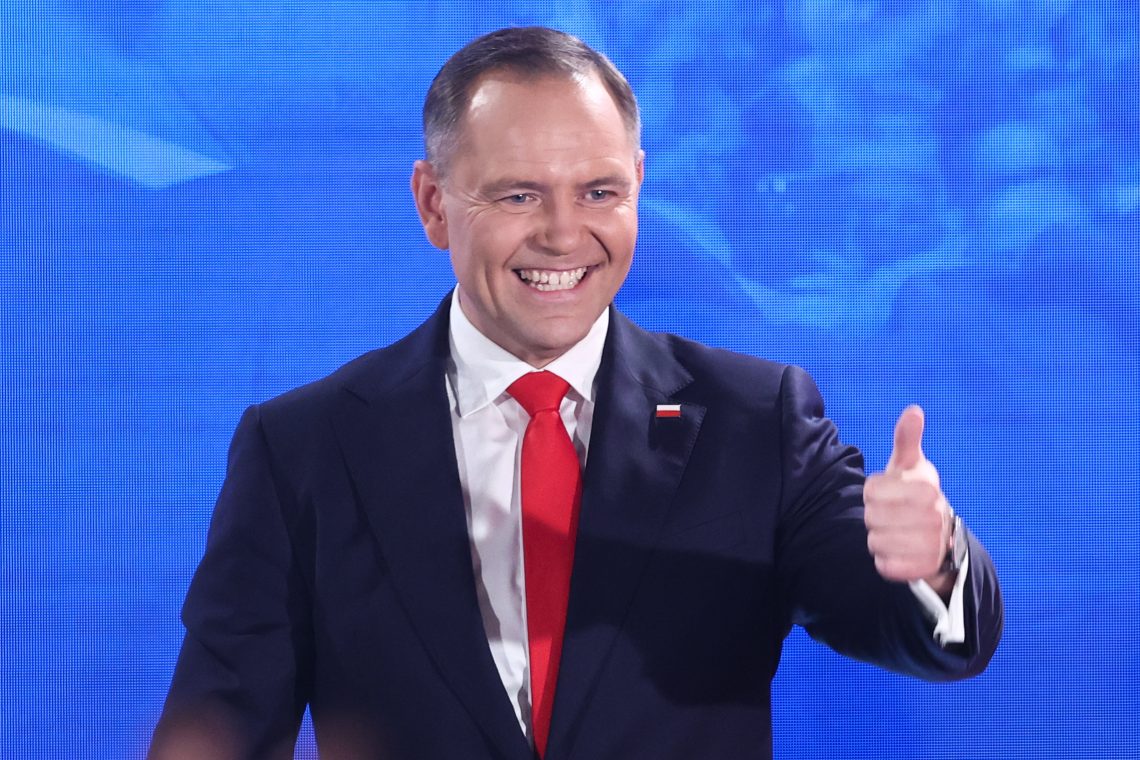Nawrocki victory shakes up Polish politics
President-elect Nawrocki’s win weakens Prime Minister Donald Tusk and sets Warsaw on a more U.S.-aligned, Brussels-wary course.

In a nutshell
- Nawrocki’s victory weakens Tusk, as political polarization deepens
- New president likely to continue President Duda’s approach, with tweaks
- He is an asset for Poland’s ties with the U.S., but not for Brussels and Berlin
- For comprehensive insights, tune into our AI-powered podcast here
On August 6, conservative Karol Nawrocki takes the oath of office as president of Poland. He has defeated formidable opponents – not only his rival, the center-left Warsaw mayor Rafal Trzaskowski, but also the major power brokers at home and abroad who backed him. After winning the vote count on June 2, Mr. Nawrocki experienced formal challenges by Prime Minister Donald Tusk and his former Justice Minister Adam Bodnar that lasted for a month, followed by another four weeks of public questioning of the outcome.
The government alleged electoral irregularities and questioned the legitimacy of the Supreme Court judicial chamber that certified his victory. All of this came even after European Union Commission President Ursula von der Leyen, German Chancellor Friedrich Merz, Ukrainian President Volodymyr Zelenskiy, United States President Donald Trump and others quickly congratulated Mr. Nawrocki as the winner.
The Polish Supreme Court thoroughly examined and dismissed these objections, pointing out on July 1 that the government had not challenged the legitimacy of the same chamber’s confirmation of the 2023 parliamentary elections that certified the Tusk government and elected Mr. Bodnar to the Senate, nor the 2024 Warsaw and European Parliament elections. It further argued that the approximately 20 cases of discrepancies uncovered during recounts would not have changed the outcome of the election.
The final result thus remained virtually the same as announced on June 2, with 42 year-old Mr. Nawrocki, an independent backed by the conservative Law and Justice (PiS) Party, obtaining some 50.9 percent of the vote, and 53 year-old Mr. Trzaskowski, backed by the center-left coalition led by Civic Platform (PO) – Poland’s main ruling party – at 49.1 percent, losing by a margin of 1.7 percent, or less than 370,000 votes, the smallest in post-1989 history. Recounts showed that some 18,000 votes shifted to Mr. Trzaskowski, far too few to have affected the outcome.
By July 1, Prime Minister Tusk’s coalition partners had recognized Mr. Nawrocki as the winner. Nonetheless, Mr. Tusk continued to question the outcome throughout July, and Parliament Speaker Szymon Holownia caused an uproar on July 25 by telling Polsat TV that persons associated with the coalition had suggested the president-elect should not be inaugurated. The revelation indicated continuing government efforts to sow doubt about the outcome. Others close to the government have spoken of taking the matter to the European Court of Human Rights.
Mr. Nawrocki’s victory dealt a huge blow to the Tusk government, which very much needed the presidency to deliver on many as-yet largely unfulfilled 2023 campaign promises, boost its sagging ratings and set itself up to win the next parliamentary election, scheduled for fall 2027.
Who is Karol Nawrocki and how did he win?
Like current President Andrzej Duda, Mr. Nawrocki was not a professional politician when PiS nominated him as its candidate. Formally, he is an independent. A one-time amateur boxer with a PhD in history who entered politics from his position as Director of the Institute of National Remembrance, a Warsaw-based, state-funded research institute focusing on crimes against the Polish nation, he was not well known nationally and not practiced in the rough and tumble of Polish politics.
His opponent was the polished, nationally known, long-serving mayor of Warsaw, Rafal Trzaskowski, who had come very close to winning the presidency in 2020. Mr. Trzaskowski also enjoyed the support of the urban establishment that largely sets the political agenda in Poland, the mainstream media that dominate the airwaves and social media, the European Commission that provides billions of euros in subsidies to the state budget annually, and the German government that has had a strong relationship with Mr. Tusk and his PO party for years.
Mr. Nawrocki also overcame major funding gaps after the government refused to provide him with the state support required by law for candidates’ campaigns. He faced late-breaking allegations that raised questions about his character, the source of which may have been the domestic intelligence agency ABW. Although each of these major power centers made their preference for Mr. Trzaskowski clear, Mr. Nawrocki still won, handing the Warsaw mayor his second defeat in a presidential election and fueling speculation that his political aspirations for the palace have ended.
The election was also a referendum on the Tusk government.
A number of factors contributed to Mr. Nawrocki’s victory. He came across to the average voter as a smart, authentic candidate, closer to their concerns than Mr. Trzaskowski, who was perceived as the anointed candidate of the liberal, urban Polish elite backed by Brussels and Berlin. While Polish voters have become more progressive over time – for instance, more tolerant of abortion, gay rights and EU influence in domestic affairs – traditional values of family, church, region and nation (summarized by one of Poland’s most famous mottos “Bog, Honor, Ojczyzna” or “God, Honor, Country”) remain rooted in large swaths of the country.
As a historian who long focused on Poland’s tragic past, Mr. Nawrocki’s bona fides as a patriot and protector of Polishness and the national interest were clear. In contrast, large constituencies associated Mr. Trzaskowski with the Tusk government’s subordination of Polish interests to foreign interests, including moving away from bedrock Polish values. The Nawrocki campaign also benefitted from a perception among voters that coalition politicians looked down on them – not unlike Hillary Clinton’s 2016 reference to some U.S. voters as “a basket of deplorables.” Coalition politicians reinforced this sense of cultural condescension by reminding the public that Mr. Trzaskowski speaks five languages and making fun of Mr. Nawrocki’s English, which he speaks well.
Mr. Nawrocki and his campaign also assessed the mood and priorities of the Polish electorate more accurately than did the Trzaskowski campaign. The latter seems to have concluded from its 2023 victory that voter demographics and preferences had changed permanently and that with strong support from the major power centers its victory was all but assured. This led to a certain complacency in the campaign and unforced errors.
Meanwhile, Mr. Nawrocki campaigned much more vigorously and was particularly effective in connecting with rightist constituencies, especially younger, male demographics in the critical second round, gaining most voters of the right-wing Konfederacja party, which won almost 15 percent in round one. Mr. Trzaskowski was unable to grow his center-left coalition as much, even as he framed his candidacy as another epic battle between “democrats” and “autocrats” and portrayed himself as the last bastion against “illiberalism.”
The election was also a referendum on the Tusk government. Mr. Nawrocki gained from the prime minister’s loss of popularity, with few results to show after 18 months in office and voter fears of Mr. Tusk taking control of all institutions of state. Mr. Nawrocki benefitted as well from his opponent’s mistakes, such as tone-deaf behavior at debates and other public events, which reinforced his image as disconnected from voters.
Relying on opinion polls that chronically undercount conservative sentiment, Mr. Trzaskowski’s campaign believed the results published by mainstream opinion survey firms that showed PiS was behind. It became overconfident that it could defeat the unknown, untried and untested Mr. Nawrocki. These factors also played a role in subsequent government efforts to challenge the results.
Facts & figures
Finally, Mr. Nawrocki benefitted more from U.S. Republican support than Mr. Trzaskowski did from U.S. Democrat support. Mr. Nawrocki’s May 1 meeting with President Trump in the Oval Office, about two weeks before the first round, demonstrated that he had access to, and the endorsement of, Poland’s most important ally. This echoed President Trump’s White House meeting with Mr. Duda prior to the 2020 presidential election, which contributed to his reelection. U.S. Homeland Security Secretary Kristi Noem’s May 27 in-person endorsement at the Conservative Political Action Committee conference in Rzeszow, timed to take place just before the election’s second round and held in Poland for the first time, strengthened Mr. Nawrocki’s message on strong borders. Immigration has become such an important issue in Poland that the Tusk government has been forced to revise its own policies and move much closer to those of PiS.
In contrast, former U.S. President Barack Obama and former Secretary of State John Kerry’s endorsement of Mr. Trzaskowski at a large rally in Poznan on May 15, right before the first round of the election on May 18, resonated primarily within the Warsaw mayor’s liberal bubble but not across the broader electorate. Voters sensed that Mr. Trzaskowski did not have much influence with the current U.S. president, who still enjoys much support despite an approach to Russian President Vladimir Putin that Poles widely perceive as weak, inconsistent and unlikely to generate results.
How will the weakened government proceed?
Mr. Tusk will now be unable to advance key legislative priorities – especially changing the judiciary and liberalizing social policy on abortion and same-sex civil unions, which has contributed to his decline in popularity – because he does not have the majority to overturn vetoes, which Mr. Nawrocki is likely to exercise. He will also be hampered on some foreign policy priorities, such as confirming full-fledged replacements for the approximately 50 PiS-appointed ambassadors he fired, as the Polish constitution gives the president a key role in confirming ambassadors. Mr. Tusk also needed his candidate in the presidency to stabilize the coalition.
In response to the challenge to his mandate posed by Mr. Nawrocki’s victory, Mr. Tusk held a vote of confidence on June 11. He won that vote, demonstrating continued support for his government and shoring up his shaky coalition, which ranges from left to center-right. He also argued that Mr. Trzaskowski’s narrow defeat demonstrated sufficient popular support for his government to continue in office.
On July 23, Mr. Tusk reshuffled his cabinet to regain momentum and breathe new life into his government. He replaced about one-third of his ministers, those who had become liabilities or were not delivering, including Mr. Bodnar and Health Minister Izabela Leszczyna. He promoted others who have been particularly effective, like Foreign Minister Radek Sikorski, to the post of deputy prime minister. He also merged key portfolios to form two super ministries (the ministry of energy and the ministry of finance), reducing the overall number of ministries from 26 to 21. And, to cement faltering party discipline, he signaled that his ministers and MPs will be expected to support his agenda or face losing their jobs.
Mr. Tusk’s popularity and that of his party and coalition has fallen by some seven percent since the spring. Recent polls show 32 percent positive and 44 percent negative approval ratings. His party now trails PiS by about 26 to 29 percent. Based on these numbers, if parliamentary elections were held now, PiS could form a government together with Konfederacja, possibly even with a two-thirds super-majority (307 of 460 MPs) that would enable the government to amend the constitution. Projections are speculative, but a different governing constellation is no longer as far-fetched as it seemed after the Tusk government assumed office with a clear mandate in December 2023.
The question now is how much Mr. Tusk’s party and its coalition partners blame him for Mr. Trzaskowski’s defeat and the continued weakness of his government. Much criticism has come from within the coalition, as politicians ask how their candidate could possibly have lost the presidency. They point out Mr. Tusk’s decline in popularity and wonder whether they are better off staying with him or another governing constellation.
For now, the coalition partners prefer to stay, as many MPs would lose their seats and appointees would lose their jobs in an early election, but pundits have begun to talk openly about how long the government in its current form will last and whether this might be the beginning of the end of 68 year-old Mr. Tusk’s political career, even as he shows no signs of giving up.
Dueling narratives over the winner
The Tusk government has tried to paint Mr. Nawrocki as an “extremist” and as the representative of an “illiberal future” who will seriously set back Polish interests. Foreign commentators and media largely echo this view, aided by coalition politicians and pro-government media that allege that “democracy is at stake,” and that expect the “assault on democratic institutions, rule of law and human rights in Poland” to continue. They usually refer to him as a populist, far-right nationalist and euroskeptic. Some call him “radical,” “Moscow’s candidate” and even a “hooligan” for his alleged youthful participation in clashes between soccer fans, which they paint as his “murky past.” One Polish scholar labeled him “a scandal-plagued laughingstock.”
Mr. Tusk has denounced Mr. Nawrocki’s opposition to immediate NATO membership for Ukraine as “no better … than treason,” “one of the biggest scandals of the campaign,” and “echo[ing] Putin’s demands.” Former Solidarity hero and President Lech Walesa threatened to go into internal political exile if Mr. Nawrocki were to win (though he has not done so). Former Soviet-era dissident and current chief editor of the prominent liberal-left daily Gazeta Wyborcza Adam Michnik said “half of Poland went down the wrong path,” as Germany did in 1933. Yet voters, at least enough of them, ignored these labels and controversies. Meanwhile, Jaroslaw Kaczynski, the PiS leader detested by liberals in Poland and abroad, proved that even at age 76, he is cleverer than his nemesis, Mr. Tusk, and that he could still pick a winner.
Read more from Central Europe expert Matt Boyse
- Breaking the German-Polish deadlock
- China increasing its bets on Serbia and Hungary
- Vote may reverse Slovakia’s pro-Western policies
Mr. Nawrocki campaigned as a committed conservative, a man of deep Catholic faith, a Polish patriot, a vigorous defender of Polish interests, strongly anti-Kremlin, pro-NATO – he rejects efforts to create a “second NATO” on the grounds that Poland’s security is firmly within NATO – and very pro-American, including pro-Trump. He supports the EU, but as a union, not a superstate, and has never advocated for leaving the EU. He opposes expanding EU defense competencies if they conflict with those of NATO. He is pro-nuclear energy and does not support the EU Green Agenda or prioritizing the climate over the economy.
Mr. Nawrocki challenges traditional understandings of EU competencies, particularly on issues like migration and home affairs, and has been careful to compare his positions with those of member states like Denmark to demonstrate that he is not far outside the mainstream. He has also criticized the EU for remaining silent about the Tusk government’s weaponizing of the rule of law against PiS. All this has earned him criticism in Brussels and in pro-EU circles as a “euroskeptic,” but the term “soft-euroskeptic” is more accurate, and he enjoys considerable domestic support for these positions.
Nawrocki’s foreign policy agenda
The Polish president has more than a symbolic role in foreign and security policy, but he has only indirect influence. According to the constitution, he shares responsibility with the prime minister and foreign minister. Mr. Nawrocki has signaled that he will use his powers a little differently from Mr. Duda. On Ukraine, he will take a more nuanced approach, not supporting fast track accession to the EU “until important civilizational issues are resolved,” because of his focus on history and accountability, which he calls his “demarcation (red) lines.” He argues that true reconciliation and EU integration is not possible without dealing with the massacres and other crimes committed by Ukrainian partisans against Poles during 1943-1945 in Volhynia and other parts of what was then eastern Poland. He has opposed Ukrainian agricultural imports to the EU because they undercut Polish farmers’ interests. He opposes NATO membership for Ukraine until Kyiv addresses historical grievances and considers some social benefits for Ukrainian refugees as disadvantageous to Poles.

Mr. Nawrocki’s positions are influenced in part by a September 2023 speech Ukrainian President Zelenskiy made to the UN General Assembly, which criticized Poland as assisting Russia, which did not go down well in Poland, one of the most anti-Putin nations. Mr. Nawrocki has stuck to his stance despite accusations of “playing into Russia’s hands,” a charge he flatly rejects. He is strongly anti-Putin and supports Kyiv in its war for survival, emphasizing that “the Polish state must support Ukraine from a strategic and geopolitical point of view” because “the biggest threat … is the Russian Federation,” which he calls “a post-imperial, neo-communist state headed by … a war criminal.”
Many commentators put Mr. Nawrocki in the “illiberal” category with Hungarian Prime Minister Viktor Orban and Slovak Prime Minister Robert Fico, because he opposes illegal immigration, promotes traditional values and focuses on historical grievances with Ukraine. While Mr. Nawrocki overlaps with Mr. Orban and Mr. Fico on strong borders and traditional values, he does not align with their approach to Mr. Putin, energy dependence on Russia or treating communist China as a trading or investment partner like any other.
Mr. Nawrocki has said relatively little about China, which suggests a certain continuity in his predecessor’s pragmatic approach. His strong views on Poles’ suffering during World War II preview a slightly different approach on Israel and Jewish issues: He seems less inclined to prioritize the Holocaust and has suggested ending Mr. Duda’s tradition of inviting Jewish leaders to the presidential palace to light Hanukkah candles. Mr. Nawrocki is unlikely, however, to swap out the ambassador to Israel, one Tusk nominee President Duda did approve.
Scenarios
Likely in the short term: Coalition muddles through with Tusk
Coalition leaders know they must stand together or hang separately, even if Prime Minister Tusk is weakened and his fortunes are declining. They understand it would be political suicide to abandon the government, particularly when there is no clear alternative for prime minister. Mr. Sikorski is talented but has less of a political base than Mr. Tusk.
If the coalition were to face a major crisis, the agrarian PSL party, led by former Deputy Prime Minister Wladyslaw Kosiniak-Kamysz, could offer his party for the prime ministership, but it has far fewer MPs than Mr. Tusk’s PO. The PSL is unlikely to flip to the opposition as its members in June rejected the idea of abandoning the coalition for PiS; while the two parties overlap in some areas, they have never been in a coalition and are in different political families. Early elections are a huge risk that the coalition parties are likely to try very hard to avoid.
Mr. Nawrocki generally represents continuity on Duda-era foreign, security and domestic policies, but with edits and nuances. Though he complicates Mr. Tusk’s Ukraine policy by stressing historical grievances, he has exceptionally strong anti-Kremlin instincts. Ties between the presidential palace and the Trump administration will continue to be much stronger than those of the Tusk government or those had Mr. Trzaskowski won, and will be an asset to U.S.-Polish relations. Mr. Sikorski has even publicly welcomed this, commenting, “Now, we can play on two pianos at the same time.” Mr. Nawrocki will play a critical role in that relationship, including possibly as a “Trump whisperer.”
Mr. Tusk will face a decision point in November, when Mr. Holownia is due to move into the deputy prime minister role. Given Mr. Tusk’s anger at Mr. Holownia’s recent actions, however, it is logical to wonder whether that will happen. How that transition unfolds will foreshadow where the coalition is going. These decisions will all take place against the background of increasing domestic economic challenges, including layoffs and budget deficits.
Unlikely wildcard in the short term: Continuing to challenge the election outcome
The Tusk government would make a major mistake if it continues to challenge the election results, for example by taking the matter to the European Court of Human Rights, as some PO leaders have suggested. EU leaders have already congratulated Mr. Nawrocki, while the other coalition party leaders have accepted his victory. However, coalition officials, politicians aligned with the government, and commentators are likely to continue raising what they strongly consider flaws in the courts and judicial system.
Likely in the medium term: Turbulence for Tusk
The strong tension in the cohabitation arrangement between the two rival political formations may grow into confrontation, given the vilification Mr. Nawrocki experienced during the campaign and the fierce and relentless attacks PiS has faced from Mr. Tusk’s government since it took office in December 2023. Mr. Nawrocki will be in power for five years and starts out in a strong position politically. He will not make it easy for Mr. Tusk – there will be gridlock, which the prime minister will call “blocking necessary reform.”
While the government’s relations with its two other main foreign partners, Brussels and Berlin, will remain excellent, Mr. Nawrocki is likely to approach issues in ways neither capital wishes, complicating the government’s ties. One potential clash could be over who represents Poland at the European Council. While that traditionally is the prime minister, in 2008 both President Lech Kaczynski and Prime Minister Tusk attended, causing dissonance.
Mr. Nawrocki is also likely to press Mr. Tusk to be stricter on asylum and migration issues, increasing friction with Germany and the European Commission. If he returns to the issue of reparations for Nazi-era war crimes, which seems likely, that will guarantee friction with Berlin. His soft-euroskepticism will prevent Mr. Tusk from growing Poland’s influence at the EU top table.
Given these dynamics, the question is whether Mr. Tusk’s government will survive in its current form until the next elections scheduled for fall 2027. Will it limp along until then, face another reshuffle, or collapse, paving the way for early elections? Poland’s Council of the European Union Presidency was a success, but challenges lie ahead. In any case, Mr. Tusk will have to set forth a clear and persuasive vision for the rest of his term, but his reelection in 2027 is now much more difficult to imagine.
Contact us today for tailored geopolitical insights and industry-specific advisory services.








